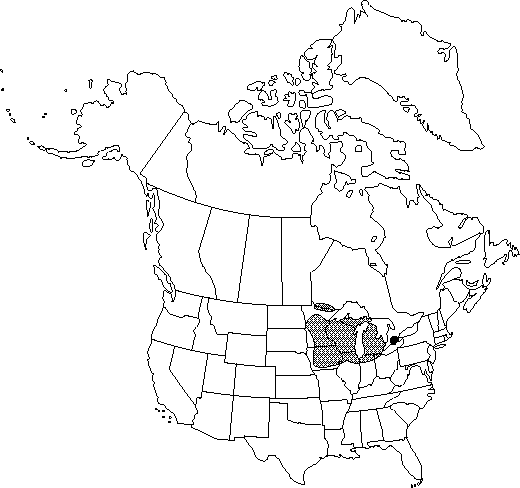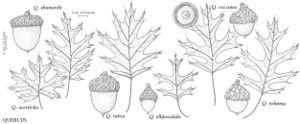Quercus ellipsoidalis
Bot. Gaz. 27: 204, plates 2, 3. 1899.
Trees, deciduous, to 20 m; lower trunk often with stubs of dead branches. Bark dark gray-brown, shallowly fissured, inner bark orangish. Twigs dark reddish brown, (1-)1.5-3 mm diam., glabrous. Terminal buds dark reddish brown, ovoid, 3-5 mm, often conspicuously 5-angled in cross section, usually silvery- or tawny-pubescent toward apex. Leaves: petiole 20-50 mm, glabrous. Leaf blade elliptic, 70-130 × 50-100 mm, base obtuse to truncate, margins with 5-7 deep lobes and 15-55 awns, lobes distally expanded, sinuses usually extending more than 1/2 distance to midrib, apex acute; surfaces abaxially glabrous except for minute axillary tufts of tomentum, adaxially glossy light green, glabrous, secondary veins raised on both surfaces. Acorns biennial; cup narrowly turbinate to deeply cup-shaped, 6-11 mm high × 10-19 mm wide, covering 1/3-1/2 nut, outer surface reddish brown, puberulent, inner surface light brown, glabrous, rarely with ring of pubescence around scar, scales with straight or slightly concave margins, tips tightly appressed, obtuse or acute; nut ellipsoid to ovoid, rarely subglobose, 10-20 × 9-15 mm, occasionally striate, glabrous, occasionally with 1 or more faint rings of fine pits at apex, scar diam. 4-8 mm.
Phenology: Flowering spring.
Habitat: Dry sandy sites, rarely on moderately mesic slopes or uplands
Elevation: 150-500 m
Distribution

Ont., Ill., Ind., Iowa, Mich., Minn., Ohio, Wis.
Discussion
In many treatments (e.g., E. G. Voss 1972+, vol. 2), Quercus ellipsoidalis is included in Q. coccinea. Variation in fruit morphology has led to recognition of several formae (W. Trelease 1919; see also R. J. Jensen 1986) and one variety (Q. ellipsoidalis var. kaposianensis, based on specimens from St. Paul, Minnesota, in which the cup tightly encloses the nut for two-thirds its length at maturity).
Quercus ellipsoidalis reportedly hybridizes with Q. rubra and Q. velutina.
The Menominee used Quercus ellipsoidalis medicinally to treat suppressed menses caused by cold (D. E. Moerman 1986).
Selected References
None.
